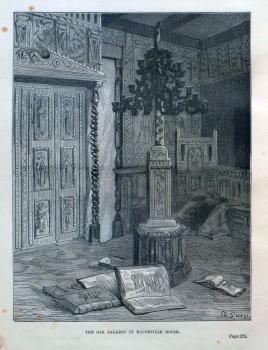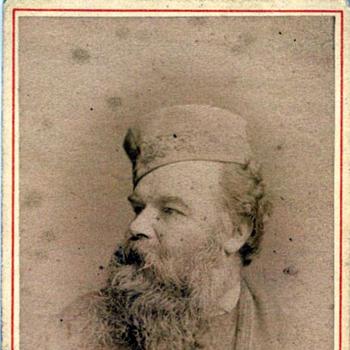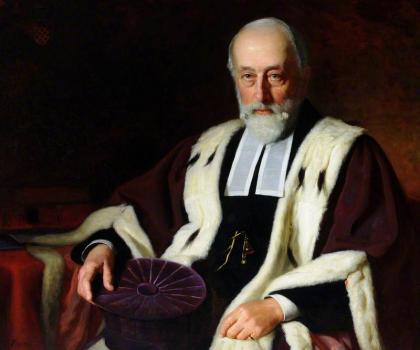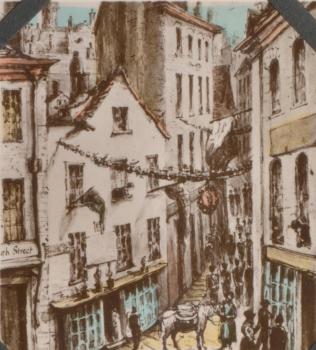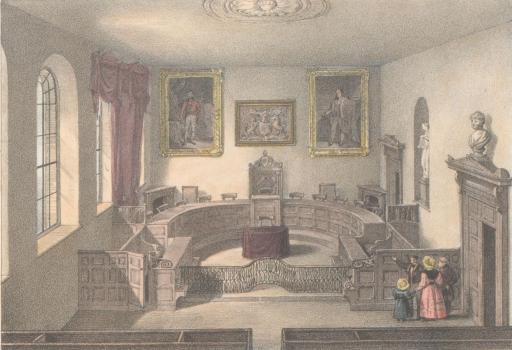5th July 2018
By Thomas Cave, from the North Devon Journal, September 20 1866. 'It is always interesting to trace the home and associations of an eminent author and to realize a little of the inner life of the man whose works instruct or amuse us, especially when the impress of his mind is so visibly traceable in the material objects about him. It seems as if the fanciful taste which has arranged all these materials at its will in turn receives daily promptings from its very creation.' The engraving of The Oak Gallery is by one of Hugo's favoured artists, Fortune Méaulle, from Alfred Barbou's Victor Hugo and his times, New York: Harper, 1881, in the Library Collection.
19th March 2018
The Priaulx Library has many photographs and cartes de visite by Arsène Garnier, including many of Victor Hugo and his family. This is part of the Victor Hugo and Guernsey project. The carte de visite above is a studio self-portrait from the Library collection, with Garnier's signature red outline and text.
6th December 2017
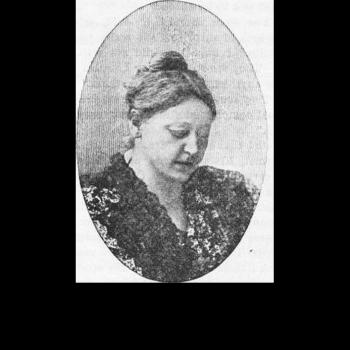
Observations and reminiscences from author Theodora Teeling, from The Star, May 4, 1880. Mrs. Bartle Teeling (née Theodora Louisa Lane Clarke) was born in Guernsey in 1851, the only child of the Rev. Thomas Clarke, Rector of Woodeaton, Oxford, and Louisa Lane, scientist and author of topographical and historical works on the Channel Islands, including contributions to MacCulloch's Guernsey Folk Lore. Theodora 'spent her childhood in Woodeaton, Oxford, where her father was rector. On his death his widow returned with their only child to Guernsey,' in 1865. They lived at L'Hyvreuse Lodge in St Peter Port. In Guernsey her mother Louisa 'became a centre of literary and scientific interest and mental activity as student and writer of natural history, etc., and author of several scientific manuals.'¹ In 1879 Theodora married Bartle Teeling (1848-1921), Captain in the Rifle Brigade, Secretary (1872) of the Catholic Union of Ireland, and Private Chamberlain to the Pope. She died in 1906. Theodora dates her reminiscences to 1867 ('12 years since'), when she would have been aged 16, and to 1878, only two years before she wrote this piece. She would have been 27 years old. The first scene, however, if she has not conflated two Christmases, must date to 1864 or before, as she includes Hugo’s son, François-Victor, in it: or it was indeed 1867, and she has misidentified the men she saw; or she has embellished the truth a little.
8th November 2017
Part of the Victor Hugo and Guernsey project.
17th October 2017
From Guernsey Life, June 1967, in the Library. 'Looking at Life,' by Michael Geraghty, concerning amongst other things an application for the transfer of a licence to run this well-known wine-bar and public house. The advertisment is from a 1934 tourist brochure in the Library collection.
9th October 2017
Snippets of the poet's life in Guernsey. This is part of the Victor Hugo and Guernsey project. [By Dinah Bott]
25th September 2017
Part of the Victor Hugo and Guernsey project. The portrait of Edgar MacCulloch is courtesy of Candie Museum, Guernsey.
25th July 2017
Advocate and friend of Hugo, Alderney's Peter Le Ber was an exceptional young man, who became editor of the Gazette de Guernesey aged only 24. This is part of the Victor Hugo and Guernsey project.
13th June 2017
By architect and wit Amias C Andros, published in the Star in 1879. See the two bound volumes of his press cuttings in the Library for further information. The illustration is A view from Marshall's Hotel, 1832, by Celia Markham (in the Priaulx Library collection.)
10th May 2017
The Eclectic Review, Vol 17 (1), 1845, pp. 540-555. 1848 is the year of revolution in Europe; in Guernsey the stirrings of the people, such as they were, occurred just a few years earlier. (The headings have been added for ease of reading.) The illustration is a print from the Library Collection dated c 1835, published by M Moss, and showing the interior of the Royal Court in St Peter Port. 'May this people ever beware of apeing the follies of their neighbours, and retain their own dignified simplicity! For it they are pre-eminent. Should they ever stoop to become imitators, they can never get beyond an humble mimicry of that which is useless and effeminate in the customs of England.'

